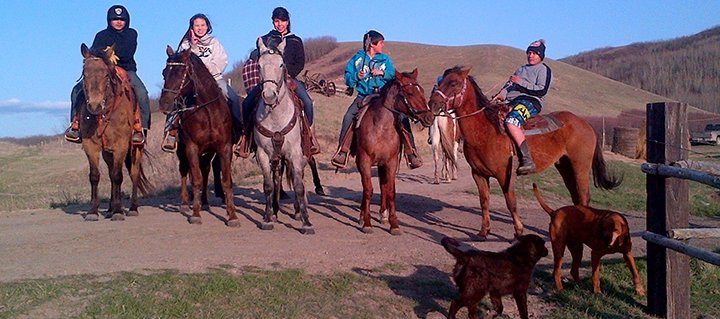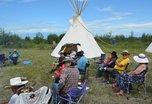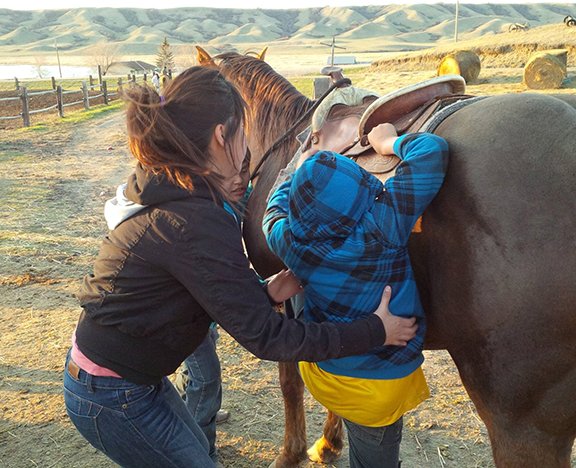Spirit Horse Project

Related Programs

Many Indigenous cultures believe the horse possesses great spiritual power and strength, as well as symbolic freedom as a teller of truth. Connecting Indigenous youth, particularly those at risk, with horses helps open the doors to healing and healthy living, as well as providing an important immersion in traditional Indigenous culture.
The Spirit Horse Project, coordinated through All Nations Hope Network, aims to provide a cultural immersion experience for young Indigenous youth growing up in the inner-city of Regina. While the project includes mentoring and training in traditional Indigenous ways, languages and ceremonies – including sessions with an Elder who engaged the youth in storytelling, singing, drumming and braiding sweet grass - a big part of the experience is learning about traditional horsemanship.
According to organizer Margaret Poitras, “Learning to interact with a large and powerful animal, such as a horse, either by caring for, learning horsemanship skills, or participating in traditional activities, offers the opportunity to develop a healthy self, including developing self-esteem, self-confidence, self-respect, self-monitoring, and self-control. It encourages the development of clear communication, healthy boundaries, assertiveness, empowerment, empathy and compassion. Also, good dose of humility and humour are important when interacting with horses.”
The Spirit Horse Project is held in partnership with the Rock Ridge Riding Program located on Eagle Brothers Ranch, on the Muscowpetung First Nation. Well-renown Indigenous horse trainer and owner/operator of the ranch, Kamao Cappo has worked with many different youth groups and is skilled at helping youth create a powerful connection with a horse.
“When I started this program 12 years ago, I wanted the children in the community to just enjoy the pure love of horses and give them the opportunity to know of the awesome experience that horses give,” he says. “I offered the program to everybody in the community, and from there it grew.”
"Participating in traditional activities offers the opportunity to develop a healthy sefl, including developing self-esteem, self-confidence, self-respect, self-monitoring and self-control."
Respecting the relationships with animals and nature are principles intrinsically woven in First Nations culture. The riding program finds success by nurturing the motivation inspired by the relationship between the horses and the young riders. Rock Ridge riders are taught to treat the horses with kindness and respect. They learn to respect the horse and learn to get along with them without being cruel or domineering.
“The horses are used as a venue to be able to speak to the children,” says Cappo. “We talk to [the young riders] about what’s coming ahead for them as teenagers and the responsibilities that they’ll have to grow into. We pass on the lessons of life that my grandparents gave to me.”
The Spirit Horse Project is one of many groups and individuals who have found benefits at The Rock Ridge Riding Program. In fact, the Riding Program is now partially operated by graduates from the program. This focus on teaching work ethic and responsibility has resulted in the area’s reserves having some of the lowest gang participation rates around. And, for those who have moved on from the program, Cappo says, almost all of the program’s graduates are now part of the workforce. “What you put into the children is what you get out of them,” he says. “We as ranchers have an obligation to give back to the community and when we do, the children and youth benefit greatly.”

Cappo explains that the Rock Ridge Riding Program primarily focuses on giving the riders a fun and enjoyable experience. “Out of ten kids, you’ll have one that will fall in love with the horses and you can’t keep them away. From there, they start to learn horsemanship, and if they stick with it they are invited to come back in the fall to ride with the more experienced youth. When riders are invited back there is an expectation of work to earn back what they receive from the program.”
The Spirit Horse Project, coordinated by All Nations Hope Network, with funding from SaskCulture’s Aboriginal Arts and Culture Leadership grant, was able to take a total of 86 children and youth out over the course of 14 day trips to the ranch for the cultural and riding experience.




